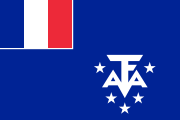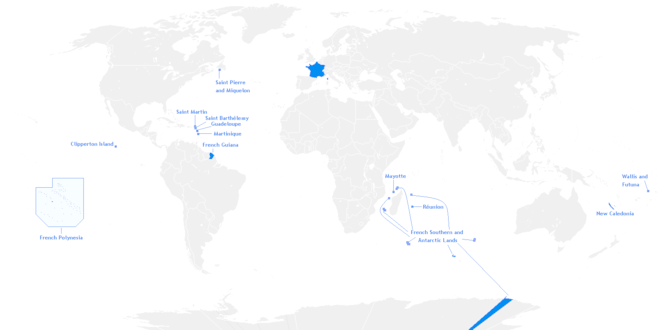Bassas da India
Bassas da India (French pronunciation: [basa da ɛ̃dja]) is an uninhabited, roughly circular French atoll that is part of the French Southern and Antarctic Lands. Located in the southern Mozambique Channel, about halfway between Mozambique and Madagascar (about 385 km [239 mi] further east) and around 110 km (68 mi) northwest of Europa Island, the rim of the atoll averages around 100 metres (330 ft) in width and encloses a shallow lagoon of depth no greater than 15 m (49 ft). Overall, the atoll is about 10 km (6.2 mi) in diameter, rising steeply from the seabed 3,000 metres (9,800 ft) below to encircle an area (including lagoon) of 80 km2 (31 sq mi). Its exclusive economic zone (EEZ), 123,700 km2 (47,800 sq mi) in size, is contiguous with that of Europa Island.
Bassas da India Bassas da India | |
|---|---|
 Flag | |
Motto: "Liberté, égalité, fraternité" | |
Anthem: La Marseillaise | |
 Location of the Scattered Islands in the Indian Ocean.
|
The atoll consists of ten barren rocky islets, with no vegetation, totalling 20 hectares (49 acres) in area. Those on the north and east sides are 2.1 to 3.0 metres (7 to 10 ft) high, while those on the west and south sides are 1.2 metres (4 ft) high. The reef, whose coastline measures 35.2 km (21.9 mi), is completely covered by the sea from three hours before high tide to three hours afterward. The region is also subject to cyclones, making the atoll a long-time maritime hazard and the site of numerous shipwrecks.
Jaguar Seamount and Hall Tablemount lie, respectively, about 40 and 70 kilometres (25 and 43 mi) further southwest.
History
The Bassas da India was first recorded by Portuguese explorers in the early sixteenth century as the "Baixo da Judia" ("Jewess Shoals"). The Judia ("Jewess", for the ancestry of its owner Fernão de Loronha[1]) was the Portuguese ship that discovered the feature by running aground on it in 1506.[2] The name became "Bassas da India" due to transcription errors by cartographers. The Santiago broke up on the shoal in 1585.
It was rediscovered by the Europa in 1774, whence the name "Europa Rocks".[3] The Malay was lost 27 July 1842 on the Europa Rocks.[4]
In 1897, the shoal became a French possession, later being placed under the administration of a commissioner residing in Réunion in 1968. Madagascar became independent in 1960 and has claimed sovereignty over the shoal since 1972.
Wildlife
The presence of Galapagos sharks was reported in 2003, which is a first in the Mozambique Channel.[5]
Tourism
Mooring at Bassas da India requires a permit from the French Government.[6] Fishing without such a permit may result in the boat being expelled or even confiscated.[7] Several illegal tourism charters departing from Mozambique or South Africa have been seized since 2013 by the French navy.[8][9]
Gallery
 Detailed map.
Detailed map. ISS photograph.
ISS photograph. Landsat 7 image.
Landsat 7 image. CIA World Factbook map.
CIA World Factbook map. CIA map.
CIA map. ISS image of Bassas da India with varying degrees of sunglint.
ISS image of Bassas da India with varying degrees of sunglint.
References
- Cardozo, Manoel Godinho (1736) [First published 1602]. "Relaçam do navfragio da nao Santiago & itenerario da gente que delle se salvou". In Gomes de Brito, Bernardo (ed.). História trágico-marítima. Volume II. Lisbon: Off. da Congregaçao do Oratorio. p. 47.
- Stuckenberg, Brian R. (December 2000). "The location and identity of the Baixos da Judia : Portuguese historical cartography of the Mozambique Channel and its relevance to the wreck of the Santiago in 1585". Natal Museum Journal of Humanities. Pietermaritzburg, South Africa: Council of the Natal Museum. 12: 51–79. ISSN 1015-0935.
- de Horsey, Algernon F. R. (1878). The Africa Pilot, Part III : South and east coasts of Africa from the Cape of Good Hope to Cape Guardafui, including the islands in the Mozambique Channel (3rd ed.). London: Hydrographic Office of Great Britain. p. 410. OCLC 36761841.
Bassas da India, sometimes named Europa rocks, was discovered by the ship Europa in 1774.
- Osgood, Chas. S.; Batchelder, H. M. (1879). Historical Sketch of Salem, 1626–1879. Salem: Essex Institute. OCLC 248257682.
- Hammerschlag, Neil; Fallows, Chris. "Galapagos sharks (Carcharhinus galapagensis) at the Bassas da India atoll: first record from the Mozambique Channel and significance can have a nursery area". South African Journal of Science. 101: 375–377.
- "Accès et mouillage dans les Eparses" [Access and mooring in the Scattered Islands]. TAAF : Terres australes et antarctiques françaises (in French). Government of France. Retrieved 3 February 2020.
- "Loi n° 83-582 du 5 juillet 1983 relative au régime de la saisie et complétant la liste des agents habilités à constater les infractions dans le domaine des pêches maritimes". Act No. 83-582 of 5 July 1983 (in French). Government of France.
- "FAZSOI : Opération combinée de contrôle des pêches dans le canal du Mozambique" [FAZSOI: Combined fisheries control operation in the Mozambique Channel] (Press release) (in French). French Ministry of Defense. 13 November 2013.
- "Pêche non autorisée : le Floréal intercepte un bateau au large de Bassas da India" [Unauthorized fishing : the Floréal intercepts a boat off Bassas da India] (in French). Imaz Press Réunion. 9 October 2014.
Further reading
- Warne, Kennedy (April 2014). "A tale of two atolls". National Geographic. pp. 62–75.
External links
| Wikimedia Commons has media related to Bassas da India. |

- "Oceandots". Archived from the original on 23 December 2010. Retrieved 2009-03-14.CS1 maint: BOT: original-url status unknown (link)
- Sailing Directions: East Africa and the South Indian Ocean
- "French Southern and Antarctic Lands". The World Factbook. Central Intelligence Agency..
